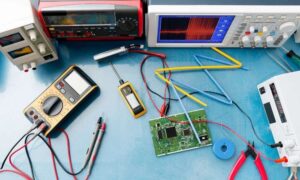
Not sure why your electronic products work flawlessly without any type of interference? The answer is EMC compliance testing. Electronic products would interfere with each other, malfunction, or get damaged without compliance EMC testing.
Highest compliance is in healthcare, automotive, and aerospace industries. EMC test equipment has to be installed by the manufacturers and has to be accompanied with an experienced EMC testing laboratory in order to maintain compliance with the standard laws. Let us describe how automotive EMC tests and overall EMC compliance are of utmost importance for electronics.
What is EMC Compliance
Electromagnetic Compatibility (EMC) is the assurance that electronic equipment functions as intended in its environment without producing or being susceptible to electromagnetic interference (EMI). EMC compliance testing is the process of verifying a device’s electromagnetic emissions and immunity to assure that it complies with regulatory standards.
Electronics products can cause other products to fail or be faulty if not properly tested. Conformity guarantees safety, performance, and regulation compliance prior to releasing products to the market.
Why EMC Compliance Matters
1. Ensures Product Safety and Reliability
EMC compliance eliminates electromagnetic interference’s impact on equipment failure. EMI failure in safety-critical industries such as automobile and medical can be catastrophic. Car EMC testing guarantees auto parts do not interfere with other parts and maintain safety systems running.
2. Complies with Regulation Standards
Authorities and governments enact tight EMC regulations in the interest of consumer protection. Non-compliance results in recall of the product, lawsuits, and market removal. Cooperation with a certified EMC lab ensures product conformity to FCC, CE, and ISO standards.
3. Saves Product Development Costs
Early compliance with EMC testing avoids wastage of resources on expensive redesigns later in the development process. Detection of EMC problems early saves production downtime and expensive redrafts and saves money and time.
4. Enhances Market Competitiveness
Product EMC compliance makes it more likely to establish confidence with the customers and authority approvals. Compliance guarantees trouble-free operation in a wide variety of environments and enhances a company’s reputation and competitiveness.
Key Steps of EMC Compliance Testing
1. Pre-Compliance Testing
Pre-compliance testing is done by manufacturers before official EMC testing services via in-house EMC test equipment. It assists in the detection of likely faults at an early stage, so the chances of failure in final testing are minimized.
2. Emission and Immunity Testing
- Emission Testing: Electromagnetic emissions of a device are tested to ascertain that they are not greater than acceptable levels.
- Immunity Testing: Tests immunity of a device against external electromagnetic interference.
3. Certification and Approval to Compliance
The products are approved to international and national EMC standards after successful testing. This is important for marketplace approval and also for obtaining consumer trust.
Selecting the Proper EMC Test Laboratory
Choosing the proper EMC test lab is a center of gaining compliant and reliable tests. Choose the regulatory agency accredited labs with the newer EMC testing capabilities. The target lab must be suitably equipped with complete EMC test facilities such as emission testing, immunity testing, and pre-compliance testing.
Conclusion
EMC compliance testing is a critical verification process that ensures electronic equipment operates safely, efficiently, and does not interfere with other equipment. Automotive EMC testing or general electronic equipment compliance minimizes risk, enhances reliability, and is regulatory compliant. EMC testing services by industry experts enable manufacturers to enhance product quality, save costs, and achieve competitive market standing.
It is not merely a case of being regulated to comply with EMC standards—its fundamental purpose is to build confidence and provide high-quality, dependable electronic products.
